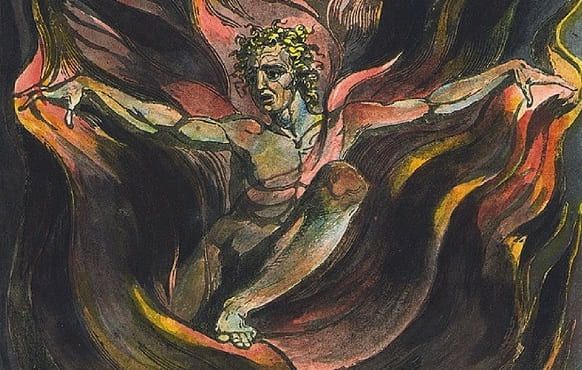
✺
In 1913, Ezra Pound wrote “The Return.” It is a short lyric, part of the era in which Pound expressed himself in sharp, clear images, in contrast to the obscurities of his later work. In the poem, we are asked to observe mysterious figures moving towards us,
“With fear, as half-awakened;
As if the snow should hesitate
And murmur in the wind,
and half turn back.”
After long hibernation, the old gods, the gods of Olympus or any other pantheon, are returning. They are a bit cold and stiff at first, cracking their backs and necks after hibernation, but soon to thaw out. This was what the young E.P. dreamed of and what he hoped the gods would bring: a world shaken from the slumber of mere give-and-take, the sleepy contingencies of daily life, and awakened to the vital force of the long-forgotten gods—who are nothing less than our own energies, the energies of a human being in full effect.
Flash forward to 1945, thirty-two years after “The Return” —passing hundreds of additional poems, decades of support to his writer friends, two world wars, residence in Fascist Italy and a series of viciously anti-Semitic broadcasts given in support of the Axis Powers—and we find Pound in U.S. military custody, charged with treason, and awaiting trial in a detention camp in Pisa. He is held in isolation in an open-air cage, denied a bed, permitted only to communicate with the chaplain, and forced to scribble his new poems on prison toilet paper. He is eventually declared insane and spends the next twelve years confined to an asylum in the United States. When he is released and returns to Italy, he greets his admirers with a fascist salute.
The case of Pound is instructive because it highlights the perils that attend the return of the gods. Yet, it is a basic human responsibility to help the gods return, to generate a world of living color rather than one monochromatic and cultureless. To do anything less would be to assume that we can “live on bread alone,” clinging to mere safety and subsistence at the expense of any passionate struggle for meaning and beauty. The gods are necessary, and life without them is impossible – gray, drab, and mechanical; a clockwork world where nothing of significance is allowed to happen. At the same time, the way they manifested in Pound’s life and in the 20th Century collectively was as destructive madness on a vast scale. It seems unfair that the choice should be as ironic as that: peace and feeling dead vs. war and feeling alive.
Homer, one of the oldest sources we have, suggests that it is always this way. When the gods come, they bring us alive only to author tragedy. They call out the full spectrum of energies in the human beings they influence, but the result is always a spectacular death, the destruction and looting of Troy, an ancient and noble city. The riches, the gold and stolen women, fail to compensate the warriors for even their own misery, being but further sources of conflict.
Do the gods need to return this way? Do they always bring slaughter and war?
The question is central to creating a potent and enduring culture of vitalism, one which beautifies life. These issues are already hotly debated online, particularly in weird Twitter circles, which feature an information battle between Nietzscheans and Christians. The Nietzscheans are often accused of being inhumane and contemptuous, whereas the Christians are often accused of being life-hating and repressive.
The conflict here boils down to aesthetics vs. ethics. The notion of a purely aesthetic life can seem shallow, a vacuous Derek Zoolander-like existence focused on curating random fashions and vibes. On the other hand, pure ethical legalism, devoid of beauty, makes life into a joyless, drab slog. Fortunately, these positions are crass and exaggerated distortions that rightly prove unpalatable to most people, however many members of both sides strain to embody them.
Both sides, at least, believe in the gods or God – something divine and higher than a mere hand-to-mouth existence. These perspectives can be fruitfully contrasted with the purely mechanistic perspective, which sees the world as a dead thing, and which is so dominant in our culture. This leads to a soulless managerial society, one in which experts carefully oversee the human digits under their control. The pagan and Christian perspectives, at their best, are both undoubtedly preferable to this spiritual death.
In his novel That Hideous Strength, C.S. Lewis provides an interesting hint at how an ethical religious perspective and vitalism can be integrated. Lewis casts the angels of Christianity in the same role as the gods of ancient Greece. But whereas the Homeric gods possess the Greeks and Trojans capriciously, based on their personal favorites, angelic influence is geared towards the greater end of realizing the Good. For instance, when the angel of Venus possesses the characters at one point in the narrative, it manifests as Charity, “the translunary virtue,” which the characters fear will “burn their bones,” but which only really orients them toward profound and gripping virtue. In other words, the powers of the Greek gods are re-aligned with the imperative of Christian love. Rather than smothering the power and beauty that makes life worth living, this ethical vision simply adjusts these powers and energies to make them serve a higher end.
In Homeric times, the Greeks existed passively in the hands of their gods, helpless to resist a sudden jolt of anger from Mars or a sudden influx of lust from Venus. In the distant past, not to mention in many hunter gatherer societies today, people see their environment as a field of divine forces waiting to act upon them. This is an existence defined by terror and tragedy. The human is at the mercy of Nature, which looms up all around, full of strange and unknown spirits. These spirits could only be propitiated, but never fully controlled or tamed. One of the great revolutions in human thought was the realization that these powers do not subsist entirely in nature alone, but are projected by the human being, and are a manifestation of the mind’s own creative energies. Gradually, this revelation paved the way for disenchantment, the graying of reality and the loss of vitality. But this was not really its import. William Blake said, “All deities reside in the human breast.” The correct lesson was not that the gods didn’t exist, but that they were the outward expression of an inner fact. Humans didn’t live and die at the mere whim of Zeus or Aphrodite. Zeus and Aphrodite were just their own runaway powers, which needed to be re-integrated.
This ethical and mystical vision, supplied not only by Christianity but by the highest teachings of the major world religions, helped to master and direct these forces to make the human being whole. Rightly considered, it does not deny these forces or suppress them, despite a long history of religious legalism attempting to do just that. Ideally, it seeks to alchemize them into something higher. Anger, for instance, is converted to wise constructive criticism, identifying and correcting flaws rather than attacking them, and lust becomes love. This notion of “inner alchemy” is found not only in Hermetic Christian thought, but in Islamic, Jewish, Buddhist, Taoist, and Hindu traditions as well.
Wedding the ethical and aesthetic helps pull the human being out of thoughtless submission to impulse. It leads to the development of a real conscience, capable of participating in existence with full vitality and wise love. This notion of an ethically charged vitalism has been present in Christianity from the beginning: in the second century A.D., St. Irenaeus wrote that “The glory of God is man fully alive.” The slander that religion necessarily deadens or destroys vitality is belied by the existence of one of the most enduring genres in Western Literature, the quest romance, which arose along with Christianity. The search of King Arthur and his knights for the Holy Grail represents a christening of the pagan warrior impulse, directed away from the mere acquisition of loot and the sacking of cities and towards a search for the transcendent. This form of literature lives on in so much of our own contemporary science fiction and fantasy literature and media.
Heidegger famously wrote that “only a god can save us.” In one sense, he was certainly right. But how the gods come to dance ranges from the creation of sublime art to a Nuremberg rally. The world without the gods is void, but the world with the gods easily hurtles towards total war. What we need is “a moral equivalent to war,” in William James’ terms, something that brings out all the courage and strength of humanity but without the bloodshed. Considering that the century following James’ remarks featured the two most catastrophic wars in the history of the world, it is clear the search hasn’t been going well.
Here, at any rate, is a humble suggestion, an indication where future developments might go. The Middle Ages were, of course, a violent time. Yet there was a common practice that proved advanced in the arts of peace. Guilds in towns and large cities would put on productions known as mystery plays (Everyman being one of the most famous) on Biblical or otherwise religious themes. Entire communities were involved in these productions, which took up a significant amount of time and energy. Everyone had a role to play in the creation of meaningfully significant art on a massive scale. The level of mobilization, craftsmanship, involvement, and energy made the mystery play something like James’ moral equivalent to war.
Now, I’m not suggesting that society could return to producing gigantic Biblical plays on a city-wide scale. There is no shared system of religious iconography that would make such unity possible. New forms, new images, new dreams need to be discovered to motivate such a total act of shared creation. In our context, this wouldn’t necessarily take the form of a play but perhaps of another art form or of a number of art forms combined. This is one path, other than war, that could bring out the vital energies of all the people in an entire city.
It is not so difficult to imagine. We can see the old iconographies and visions of human purpose, not obliterated, but re-configured and revitalized. We can take the old forms, like the mystery plays, and re-invent them, make them new. The fragments of the old iconographies will be unified and their meanings will shine out more clearly and distinctly.
For now, we dwell in a world where the gods appear to have vanished, in which some of us look back nostalgically to when all things were full of gods. But the gods dwell within us, hibernating, and can still radiate outward to re-possess the world. If we don’t see nature as a temple, inscribed with hieroglyphs and secret meanings, the deficit exists in our own eye. Nature is still a language, and we can arrange its symbols into invocations and enchantments. But, to do that, we need to know how to summon the gods to dance – without destroying ourselves in the process.

